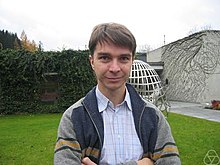Stanislav Smirnov
Stanislav Smirnov | |
|---|---|
 | |
| Born | 3 September 1970 |
| Nationality | Russian |
| Alma mater | Saint Petersburg State University California Institute of Technology |
| Awards | Clay Research Award (2001) Salem Prize (2001) Rollo Davidson Prize (2002) EMS Prize (2004) Fields Medal (2010) |
| Scientific career | |
| Fields | Mathematics |
| Institutions | University of Geneva Royal Institute of Technology Saint Petersburg State University Yale University Max Planck Institute for Mathematics IAS Princeton Skolkovo Institute of Science and Technology |
| Thesis | Spectral Analysis of Julia Sets (1996) |
| Doctoral advisor | Nikolai G. Makarov |
Stanislav Konstantinovich Smirnov (Template:Lang-ru; born 3 September 1970) is a Russian mathematician currently working at the University of Geneva. He was awarded the Fields Medal in 2010. His research involves complex analysis, dynamical systems and probability theory.[1][2]
Career
Smirnov's Ph.D was conducted at Caltech under advisor Nikolai G. Makarov, a St Petersburg mathematician. In 1998 he was employed as part of the faculty at the Royal Institute of Technology in Stockholm, after which he took up his second position as a professor in the Analysis, Mathematical Physics and Probability group at the University of Geneva in 2003.[3][4]
Research
Smirnov has worked on percolation theory, where he proved Cardy's formula for critical site percolation on the triangular lattice, and deduced conformal invariance.[5] The conjecture was proved in the special case of site percolation on the triangular lattice.[6] Smirnov's theorem has led to a fairly complete theory for percolation on the triangular lattice, and to its relationship to the Schramm–Loewner evolution introduced by Oded Schramm. He also established conformality for the two-dimensional critical Ising model.[7]
Awards
Smirnov was awarded the Saint Petersburg Mathematical Society Prize (1997), the Clay Research Award (2001), the Salem Prize (joint with Oded Schramm, 2001), the Göran Gustafsson Prize (2001), the Rollo Davidson Prize (2002), and the Prize of the European Mathematical Society (2004).[3] In 2010 Smirnov was awarded the Fields medal for his work on the mathematical foundations of statistical physics, particularly finite lattice models.[8] His citation read "for the proof of conformal invariance of percolation and the planar Ising model in statistical physics".[9]
Publications
- Probability and Statistical Physics in St. Petersburg, American Math Society, (2015)
References
- ^ "Stanislav Smirnov's publications on Google Scholar".
- ^ "Stanislav Smirnov's home page".
- ^ a b "La Médaille Fields pour un professeur de l'UNIGE". University of Geneva press releases (in French). University of Geneva. 19 August 2010. Retrieved 19 August 2010.
- ^ "Stanislav Smirnov's page at the University of Geneva" (in French). University of Geneva. Retrieved 19 August 2010.
- ^ "Clay Mathematics Institute". Archived from the original on 5 October 2008.
- ^ Smirnov, Stanislav (2001). "Critical percolation in the plane: conformal invariance, Cardy's formula, scaling limits". Comptes Rendus de l'Académie des Sciences. 333 (3): 239–244. arXiv:0909.4499. Bibcode:2001CRASM.333..239S. doi:10.1016/S0764-4442(01)01991-7.
- ^ "Papers of Stanislav Smirnov".
- ^ Cipra, Barry A. (19 August 2010). "Fields Medals, Other Top Math Prizes, Awarded". Science Now. AAAS. Archived from the original on 22 August 2010. Retrieved 19 August 2010.
- ^ Rehmeyer, Julie (19 August 2010). "Stanislav Smirnov profile" (PDF). International Congress of Mathematicians. Retrieved 19 August 2010.
External links
![]() Media related to Stanislav Smirnov at Wikimedia Commons
Media related to Stanislav Smirnov at Wikimedia Commons
